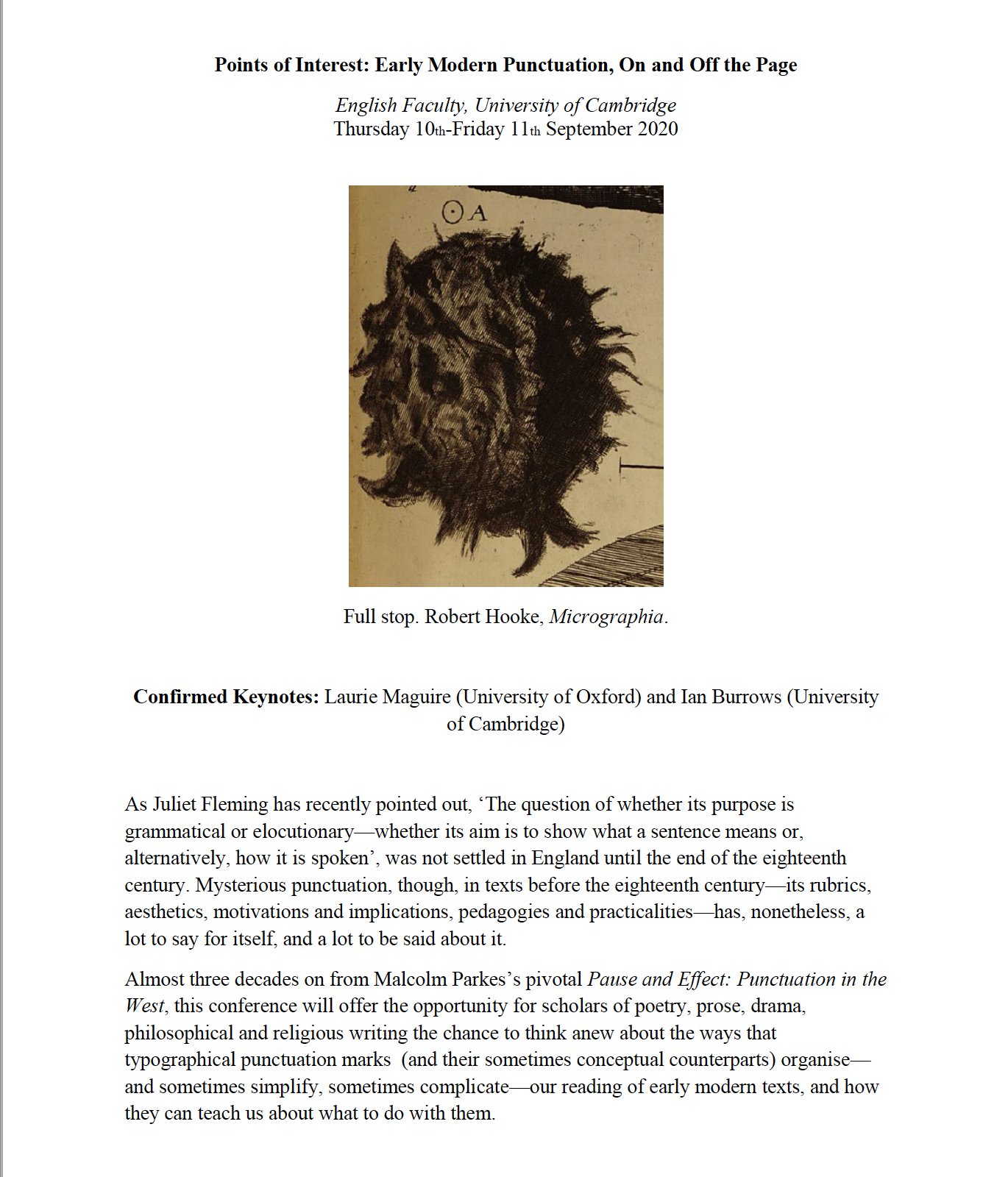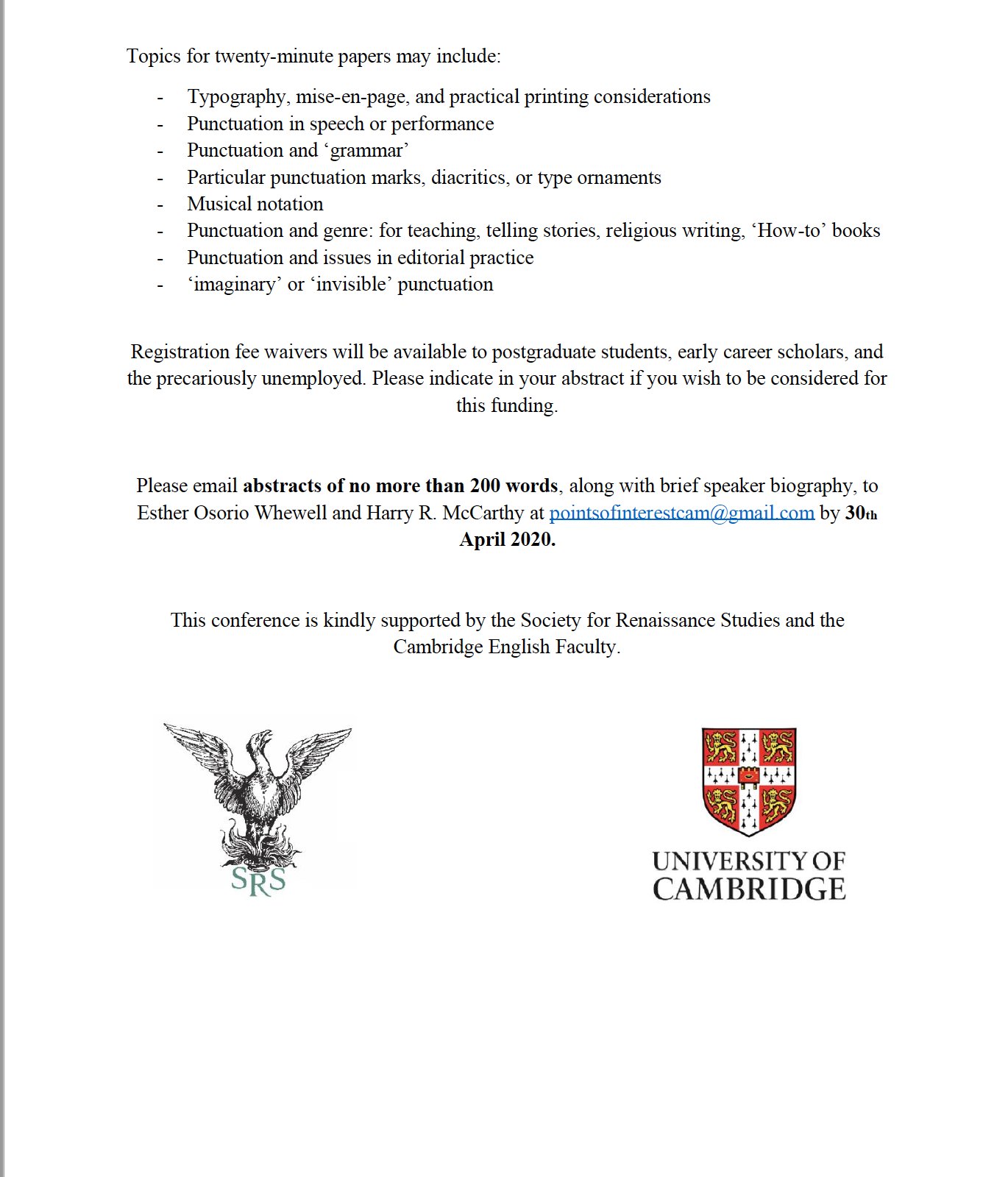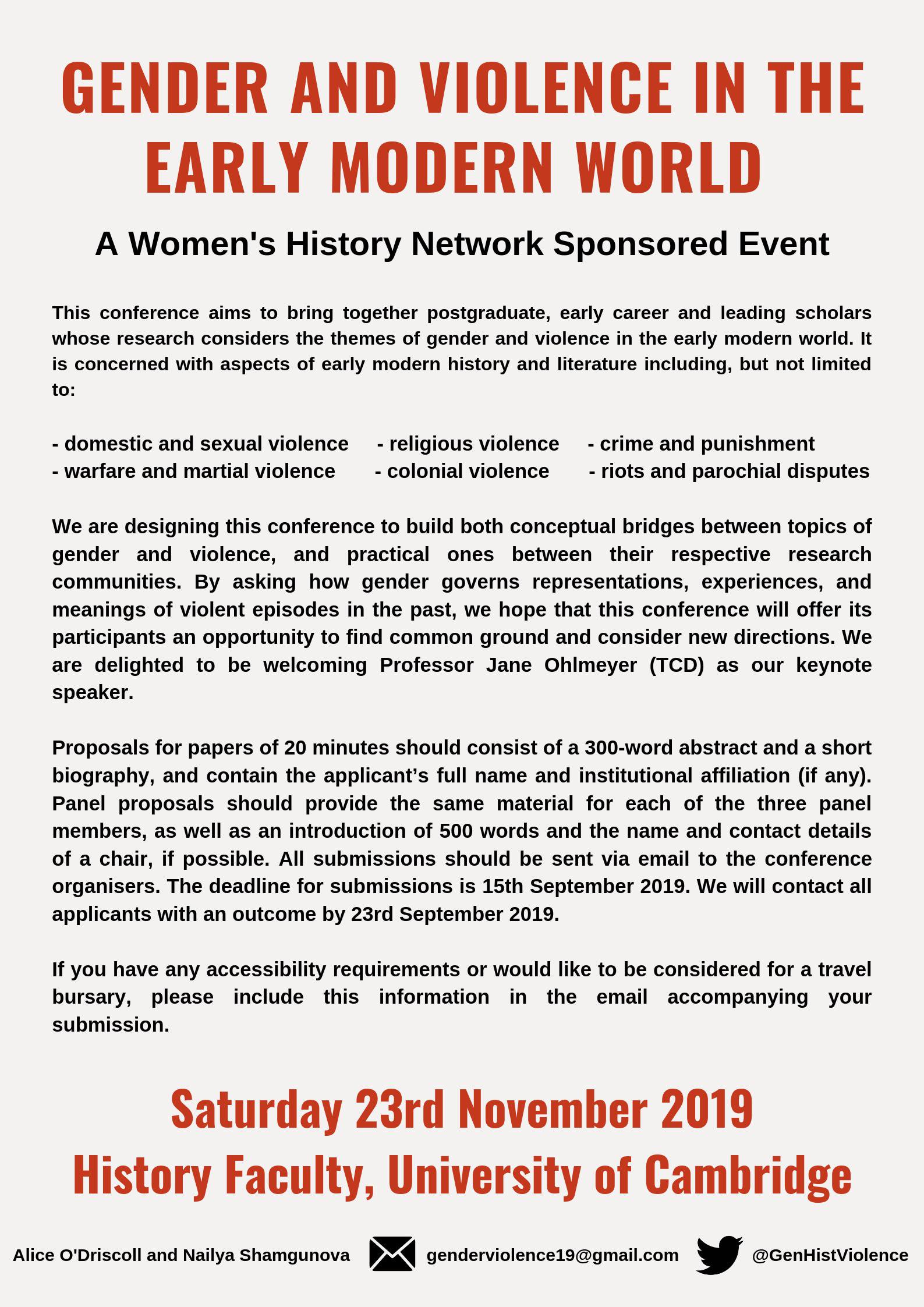Submissions are now open for the 67th Annual Meeting of the Renaissance Society of America, which is due to take place in Dublin on 7-10 April 2021. Find out more about the submission timeline and the Calls for Papers at the following link: https://www.rsa.org/page/RSADublin2021.
Category Archives: Call for Papers
CfP: Points of Interest


CfP: Gender and Violence in the Early Modern World

CFPs
CFP: European Shakespeare Research Association conference, Shakespeare and European Theatrical Cultures: AnAtomizing Text and Stage, University of Gdańsk and The Gdańsk Shakespeare Theatre, Poland, 27 – 30 July 2017
The deadline for the following seminars has been extended to MARCH 31st
1. Avant-Garde Shakespeares/Shakespeare in the Avant-Garde
2. “The accent of his tongue affecteth him:” “Accentism” and/in Shakespeare
7. Anatomizing Shakespearean Myth-making: Game of Thrones
9. Staged on the Page: Transmedial Shakespeare in Theatre and Visual Arts
11. The name of action: actors of Shakespeare and Shakespearean actors
12. Shakespeare and Music
13. Shakespearean Drama and the Early Modern European Stage
15. Magic through ritual objects and stage props: Early Modern practices and Modern adaptations
18. Staging Utopias: Shakespeare in Print and Performance
19. Shakespeare in performance in digital media
This conference will convene Shakespeare scholars at a theatre that proudly stands in the place where English players regularly performed 400 years ago. This makes us ponder with renewed interest the relation between theatre and Shakespeare. The urge to do so may sound like a commonplace, but it comes to us enhanced by the fact that in the popular and learned imagination alike Shakespeare is inseparable from theatre while the theatre, for four centuries now, first in England, then on the continent (Europe) and eventually in the world, has been more and more strongly defined and shaped by Shakespeare. Shakespeare has become the theatrical icon, a constant point of reference, the litmus paper for the formal, technological and ideological development of the theatre, and for the impact of adaptation and appropriation on theatrical cultures. Shakespeare has served as one of the major sources for the development of European culture, both high and low. His presence permeates the fine shades and fissures of a multifarious European identity. His work has informed educational traditions, and, through forms of textual transmit such as translation and appropriation, has actively contributed to the process of building national distinctiveness. Shakespeare has been one of the master keys and, at the same time, a picklock granting easier access to the complex and challenging space of European and universal values.
Please send your abstracts and biographies to seminar organisers (and cc conference organisers at gdansk@esra2017.
You need to be a member of ESRA to take part in the congress. It is free to join ESRA and you can register here (http ://www . um . es/shakespeare/esra/
The list of seminars has been made available on the ESRA and the conference website
Keynote speakers: Professor Małgorzata Grzegorzewska (University of Warsaw), Professor Diana Henderson (MIT), Professor Peter Holland (University of Notre Dame), and Luc Perceval (Hamburg Thalia Theatre)
The congress coincides with the 21st International Shakespeare Festival in Gdansk taking place at the Gdansk Shakespeare Theatre
We will continue to update our website with the details of forthcoming productions and special festival events, including workshops with invited theatre companies and meetings with theatre directors.
CFP: Shakespeare Unbound, Conference of the French Shakespeare Society, Paris, 18 – 20 January 2018
The Société Française Shakespeare is dedicating its annual conference to “Shakespeare Unbound”. The topic addresses Shakespeare’s propensity to negotiate with dominant ideologies, his ability to break and renew formal and cultural rules and his long-lasting influence in creating innovative dramatic and poetic forms, new words and thoughts, “And all that faith creates or love desires, / Terrible, strange, sublime and beauteous shapes” (Shelley), Prometheus-like. This conference will provide an occasion for academics, theatre, performance and arts practitioners to discuss Shakespeare and his contemporaries’ abilities to question and renew the boundaries of art. We welcome proposals (in English or in French) on topics such as:
– The publication and editorial history of Shakespeare’s and his contemporaries’ works — in bound and unbound formats;
– Shakespeare’s and his contemporaries’ reappropriation of classical and early modern culture, Shakespeare’s “borrowed robes”, his contribution to liberating dramatic and poetic aesthetics, and ability to “beguile Nature of her custom”;
– Shakespeare adaptations and appropriations from the 17th to the 21st century which have contributed to liberating or rediscovering his work and/or influence.
Selected proceedings will be published in the Société Française Shakespeare’s peer-reviewed online journal: http ://shakespeare . revues . org. Please send proposals by April 25, 2017 to contact@
CFP: “Show they queere substance”
Details for an upcoming event at the University of Westminster.
A 2015 episode of RuPaul’s Drag Race saw the work of Shakespeare make a perhaps rather surprising appearance on the show. In the episode, titled ‘Shakesqueer’, the season eight queens performed in rewritten Shakespeare plays – Romeo and Juliet became ‘Romy and Juliet’ and Macbeth became ‘Macbitch’. In 2016, the Globe gave us a production of A Midsummer Night’s Dream with Helenus (played by male actor Ankur Bahl) rather than Helena, transforming the relationship with Demetrius (and indeed Lysander) into an overtly queer one. At exactly the same moment, Russell T. Davies inserted a lesbian kiss into his BBC adaptation of the same play – a kiss which prompted Katie Hopkins to declare “I don’t want Shakespeare queered-up so you feel more at home”.
This queer cultural exploration of the Early Modern is happening at the same time that academic scholarship continues to use queer theoretical frames as a way of illuminating and interrogating Early Modern texts and contexts. Notably, this can be seen in John S. Garrison’s Friendship and Queer Theory in the Renaissance: Gender and Sexuality in Early Modern England (2013); Simone Chess’ Male-to-Female Crossdressing in Early Modern English Literature: Gender, Performance, and Queer Relations (2016); and Will Stockton’s forthcoming Members of His Body (2017), amongst many, many others.
This one-day symposium seeks to ask two questions: firstly, what can queer frames tell us about Early Modern texts and contexts? Secondly, in what ways can the Early Modern (be it literature, culture or politics) speak to queer cultures in the present? Or, what do queer reiterations of Early Modern texts and contexts achieve in the present?
Topics may include but not be limited to:
- the intersections between queerness and race in both Early Modern texts/contexts; and contemporary reiterations of Early Modern cultural artefacts;
- queer uses of Early Modern texts in the contemporary;
- queer readings of Early Modern texts or contexts;
- what it means to suggest that a “queered-up” Shakespeare (for example) might make one feel “more at home”;
- considerations of contemporary productions of Early Modern plays which draw out queerness or which introduce queerness;
- queer history/histories.
Abstract of 250 words, accompanied by a short bio, should be submitted to Kate Graham at k.graham1@westminster.ac.uk by March 3rd 2017.



